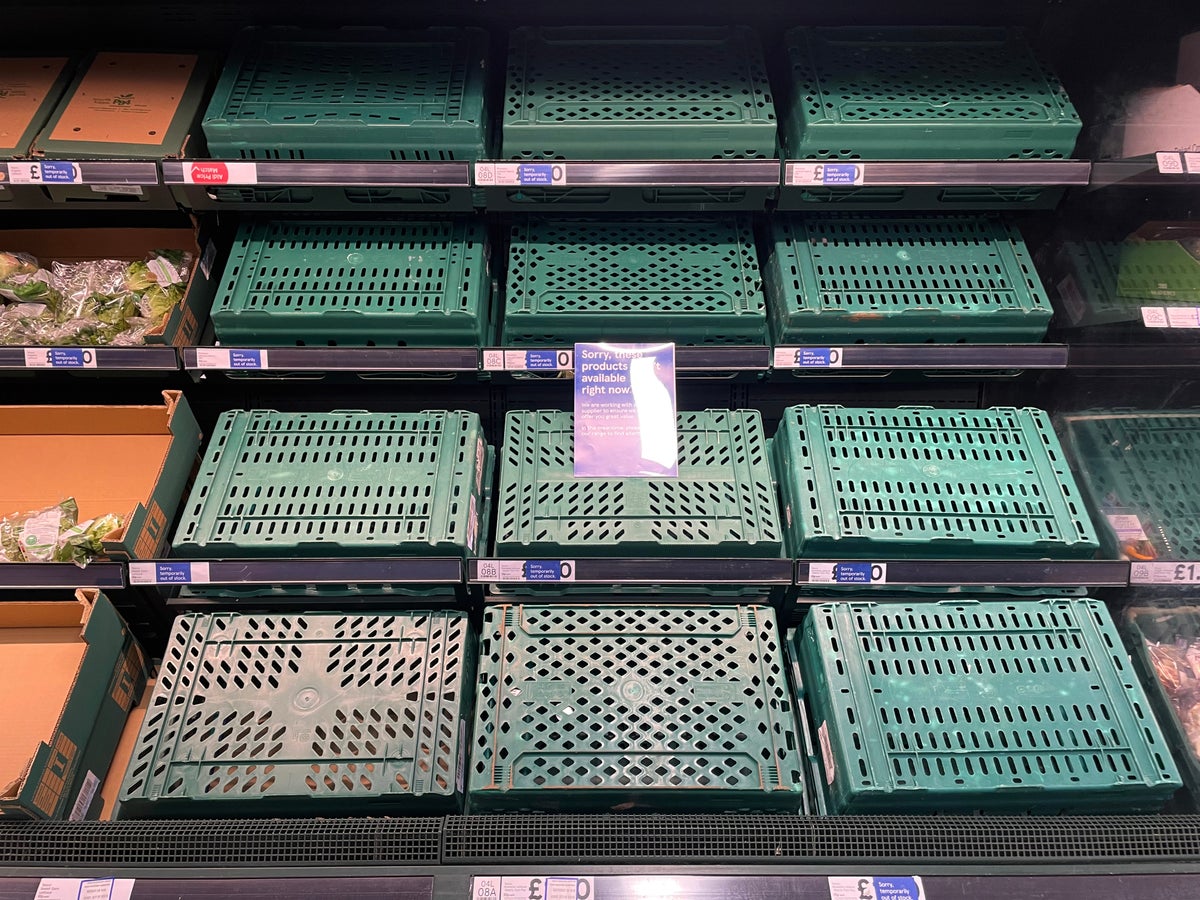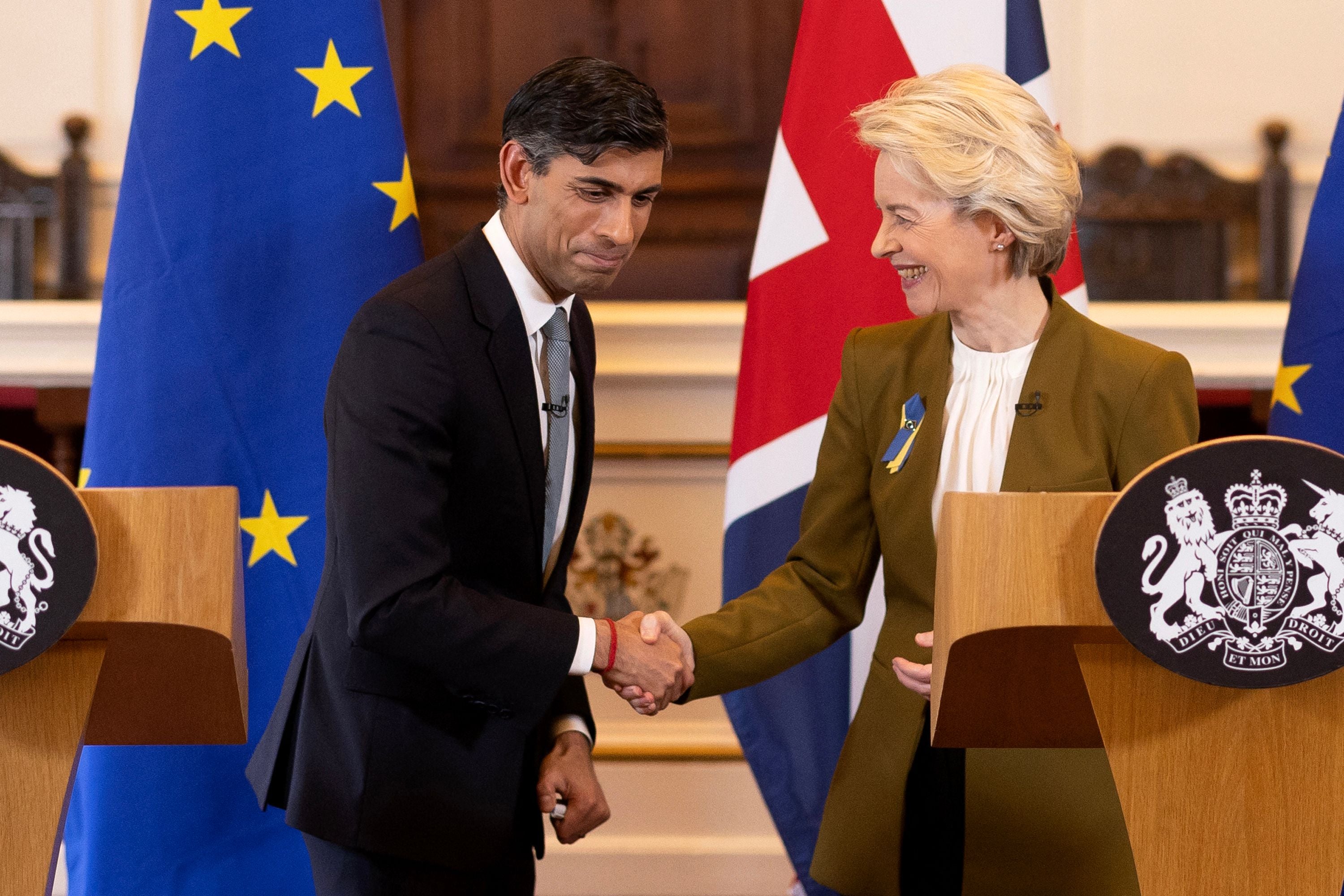
Most voters think Brexit is to blame for widespread shortages of fruit and vegetables on supermarket shelves, a poll for The Independent has found.
The majority of the public (57 per cent) said Britain’s exit from the EU was behind the lack of fresh produce, according to the Savanta survey.
Only one in three (36 per cent) said Brexit was not to blame. The poll also discovered 57 per cent had been affected by shortages while 40 per cent were unaffected.
Unusual weather which has hurt crops in Spain and north Africa has been blamed for UK shelves being short of tomatoes and other fresh produce.
But farming campaigners and food experts have pointed to Brexit for the particularly acute shortage in Britain – describing the idea of Spanish weather being solely to blame as “absolute nonsense”.
It comes as The Independent revealed that millions of pupils face missing out on fresh fruit and vegetables after the food shortages hit school meals.
School meal providers say items such as lettuce, tomatoes and cucumbers are among the items off the menu due to “extreme shortages” and “unviable costs”, with ministers now working with schools to try to minimise the impact.
In an email sent to primary schools, meals provider Caterlink, which provides more than a million meals a week to 1,300 schools, said certain fresh goods would not be available for two weeks from 1 March.
Cabinet minister Chris Heaton-Harris rejected the idea Brexit had made Britain poorer. “I say no,” he told Sky News. Asked for the evidence to back up his claim, Mr Heaton-Harris said his “evidence is we are still a growing economy, we are doing really well”.
The new poll for The Independent found widespread public support for the kind of post-Brexit deal struck by Rishi Sunak and EU to end the Northern Ireland Protocol row.
Some 44 per cent of voters supported a “compromise” with Brussels to end the dispute, with only 29 per cent opposed, according to the Savanta survey carried out before the PM announced his Windsor Framework.
While there is strong support for the easing of checks on goods moving between Great Britain and Northern Ireland (59 per cent in favour versus 21 per cent opposed), there was less enthusiasm for a deal which sees the European Court of Justice (ECJ) remain the ultimate arbiter of the protocol.
While 34 per cent are in favour of a deal in which the ECJ has a say in protocol disputes, 25 per cent are against a deal if the court still has a role.

Mr Sunak has said his deal addresses sovereignty issues through the so-called Stormont brake, which gives the Northern Ireland Assembly the power to reject changes to EU goods rules.
However, senior DUP MP Sammy Wilson said the Stormont brake “is not really a brake at all” as the unionist party decides whether to back the agreement and return to power-sharing in Belfast.
DUP officials are concerned that the UK government has final say over whether Stormont politicians could veto any future law – predicting ministers in London would be reluctant to do so because of fears of “retaliatory action” from the EU.
Chris Heaton-Harris, the Northern Ireland secretary, said he would hold talks with political parties this week about the Stormont brake, revealing that the DUP had asked for “clarifications”.
The minister said the brake was “a veto”, telling Sky News’s Sophy Ridge on Sunday: “If it’s going to affect Northern Ireland in a significant way we would veto EU law.”
Sinn Fein’s vice president Michelle O’Neill warned that governance in Northern Ireland would probably involve a joint arrangement between the UK and Irish governments if the DUP insisted on its blockade on devolution.
Ms O’Neill said it was time for the DUP to show “leadership”, adding: “Probably the alternative to powersharing would be some arrangement between the British and Irish government.”
Mr Heaton-Harris said ministers could consider changes to Northern Ireland’s governance if some in the unionist community do not accept the deal. “There are other routes forward, and we need to do things on governance if that is the case.”
Meanwhile, it emerged that new arrangements outlined in the Sunak deal could take at least two years to be implemented in full. “Essentially, it is a phased introduction over this year and in 2024,” a government source told The Guardian.
Changes to the labelling for goods moving across the Irish Sea through a new “green lane” are said to be staggered and are not expected to be fully implemented until as late as July 2025.
The Savanta poll for The Independent surveyed 2,265 adults between 24 and 26 February.







